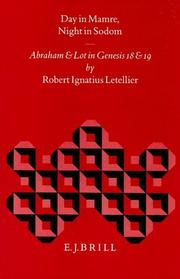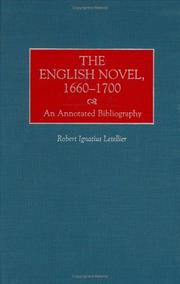| Listing 1 - 10 of 76 | << page >> |
Sort by
|
Book
ISBN: 9780754660392 9781315097282 9781351576628 9781138257641 Year: 2008 Publisher: Aldershot Ashgate
Abstract | Keywords | Export | Availability | Bookmark
 Loading...
Loading...Choose an application
- Reference Manager
- EndNote
- RefWorks (Direct export to RefWorks)
Meyerbeer, Giacomo --- Composers --- Dramatic music --- Compositeurs --- Musique de scène --- History --- History and criticism --- Histoire --- Histoire et critique --- Meyerbeer, Giacomo, --- Musique de scène --- 19th century

ISBN: 9004102507 9004494138 9789004102507 9789004494138 Year: 1995 Volume: 10 Publisher: Leiden ; New York Brill
Abstract | Keywords | Export | Availability | Bookmark
 Loading...
Loading...Choose an application
- Reference Manager
- EndNote
- RefWorks (Direct export to RefWorks)
Recent developments in Pentateuchal studies - from both diachronic (historical) and synchronic (literary-textual) perspectives - have made it possible to read Genesis 18 and 19, the evocative story of Abraham and Lot, in a new light. This work uses both types of approach to examine the text, (1) considered in its own terms - its structural and linguistic features, in a detailed close reading of each verse - and (2) considered in terms of its symbolism and imagery in relation to those found in comparable cultures of the ancient Middle East. The end product is an integrated reading of the Abraham and Lot story as a sustained literary unit, and the reading process demonstrates the value of a range of exegetical methods - structuralist, linguistic, literary, historical and anthropological - in the continuing exploration of this well-known biblical narrative.
Bible --- Criticism, interpretation, etc --- 222.2 --- Genesis --- Bible. --- Criticism, interpretation, etc. --- Exegesis --- Genesis (Book of the Bible) --- Literary Structure

ISBN: 0313303681 Year: 1997 Volume: 53 Publisher: Westport, Conn. : Greenwood Press,
Abstract | Keywords | Export | Availability | Bookmark
 Loading...
Loading...Choose an application
- Reference Manager
- EndNote
- RefWorks (Direct export to RefWorks)
English fiction --- European fiction --- Fiction --- Roman anglais --- Roman européen --- Roman --- Bibliography. --- Translations into English --- Bibliographie --- Traductions anglaises --- Bibliography --- Roman européen
Book
ISBN: 9781443877084 9781443868174 1443877085 9781443866903 1443866903 1443868175 1443885088 9781443885089 9781443884259 1443884251 Year: 2015 Publisher: Newcastle upon Tyne, England : Cambridge Scholars Publishing,
Abstract | Keywords | Export | Availability | Bookmark
 Loading...
Loading...Choose an application
- Reference Manager
- EndNote
- RefWorks (Direct export to RefWorks)
Operetta developed in the second half of the 19th century from the French opéra-comique and the more lighthearted German Singspiel. As the century progressed, the serious concerns of mainstream opera were sustained and intensified, leaving a gap between opéra-comique and vaudeville that necessitated a new type of stage work. Jacques Offenbach, son of a Cologne synagogue cantor, established himself in Paris with his series of opéras-bouffes. The popular success of this individual new form of entertainment light, humorous, satirical and also sentimental led to the emergence of operetta as a sepa
Music --- opera's --- muziekgeschiedenis --- anno 1900-1999 --- anno 1800-1899 --- Europe --- Opérettes --- Operetta. --- Opérette --- Opérette --- Comic opera --- Musical farce --- Opera --- Liederspiel
Book
ISBN: 9781443873147 1443873144 Year: 2017 Publisher: Newcastle upon Tyne, UK : Cambridge Scholars Publishing,
Abstract | Keywords | Export | Availability | Bookmark
 Loading...
Loading...Choose an application
- Reference Manager
- EndNote
- RefWorks (Direct export to RefWorks)
This book explores the relationship between the Bible and the world of music, an association that is recorded from ancient times in the Old Testament, and one that has continued to characterize the cultural self-expression of Western Civilization ever since. The study surveys the emergence of this close relationship in the era following the end of the Roman Empire and through the Middle Ages, taking particular note of the role of Gregorian chant, folk music and the popularity of mystery, morality and passion plays in reflection of the Sacred Scripture and its themes during those times. With the emergence of polyphony and the advent of the Reformation in the sixteenth century, the interaction between the Bible and music increased dramatically, culminating in the evolution of opera and oratorio as specific genres during the Renaissance and the Early Baroque period. Both these genres have proved essential to the interplay between sacred revelation and the various types of music that have come to determine cultural expression in the history of Europe. The book initially provides an overview of how the various themes and types of Biblical literature have been explored in the story of Western music. It then looks closely at the role of oratorio and opera over four centuries, considering the most famous and striking examples and considering how the music has responded in different ages to the sacred text and narrative. The last chapter examines how biblical theology has been used to dramatic purpose in a particular operatic genre - that of French Grand Opera. The academic apparatus includes an iconography, a detailed bibliography and an index of biblical and musical references, themes and subjects.
Bible in music. --- Bible --- Songs and music.
Book
ISBN: 9781443821407 1443821403 Year: 2010 Publisher: Newcastle Cambridge Scholars Publishing
Abstract | Keywords | Export | Availability | Bookmark
 Loading...
Loading...Choose an application
- Reference Manager
- EndNote
- RefWorks (Direct export to RefWorks)
Opéra comique --- Opera --- Opéra-comique --- Opéra --- Opéra-Comique (Paris, France) --- Music --- opéra comique --- muziekgeschiedenis --- France
Book
ISBN: 1282029614 9786612029615 1443800996 9781443800990 9781282029613 1847183883 9781847183880 Year: 2007 Publisher: Newcastle : Cambridge Scholars Pub.,
Abstract | Keywords | Export | Availability | Bookmark
 Loading...
Loading...Choose an application
- Reference Manager
- EndNote
- RefWorks (Direct export to RefWorks)
Giacomo Meyerbeer remains an enigma. Until the First World War he was one of the most famous of all composers. this Reader hopes to reflect something of the immense fame, prestige and love in which this composer was once held, the voices of doubt and dismissal that began to be heard even in his lifetime, and the enduring witness to his fame and worth evinced by those who have continued to believe in him in the face of the encroaching collective disparagement. Since the centenary of his deat...
Meyerbeer, Giacomo, --- Beer, Jakob Liebmann Meyer --- Composers --- Compositeurs --- Biographies --- Criticism and interpretation. --- Compositores
Book
ISBN: 1443825980 9781443825986 Year: 2010 Publisher: Newcastle upon Tyne Cambridge Scholars Pub.
Abstract | Keywords | Export | Availability | Bookmark
 Loading...
Loading...Choose an application
- Reference Manager
- EndNote
- RefWorks (Direct export to RefWorks)
This second volume of Meyerbeer's non-operatic work is devoted to his secular choral writing for male voices, solo songs with chorus, and later songs with instrumental obbligato and local colour. Choral writing-so much part of the operatic tradition, also germane to religious music, and integral to the public music of celebration-is fundamental to the next genre Meyerbeer wrote for, the part-song, a typical German tradition. Meyerbeer's part-songs for male chorus, most of which were provided...
Vocal music --- Music --- History and criticism. --- Meyerbeer, Giacomo, --- Beer, Jakob Liebmann Meyer
Book
ISBN: 1443844330 9781443844338 9781443837101 1443837105 Year: 2012 Publisher: Newcastle upon Tyne Cambridge Scholars Publishing
Abstract | Keywords | Export | Availability | Bookmark
 Loading...
Loading...Choose an application
- Reference Manager
- EndNote
- RefWorks (Direct export to RefWorks)
Cesare Pugni (1802-70) made his debut as a composer at La Scala in 1826 with the opera Elerz e Zulmida. In the 1840s he worked closely with the choreographer Jules Perrot (1810-92) in Paris and in London, creating some of the most renowned ballets of the
Ballets --- Dance music. --- Instrumental music --- Music
Book
ISBN: 1280486023 144383596X 9786613581006 9781443835961 1443835684 9781443835688 9781280486029 6613581003 Year: 2012 Publisher: Newcastle upon Tyne : Cambridge Scholars,
Abstract | Keywords | Export | Availability | Bookmark
 Loading...
Loading...Choose an application
- Reference Manager
- EndNote
- RefWorks (Direct export to RefWorks)
Cesare Pugni was born in Genoa on 31 May 1802, and studied in Milan from 1815 to 1822, with Antonio Rollo and Bonifazio Asioli. He became a cymbalist in the theatre orchestra, and on the death of Vincenzo Lavigna, was appointed musical director. He late
Ballets --- History and criticism. --- Pugni, Cesare, --- Пуни, Цезарь, --- Puni, T︠S︡ezarʹ, --- Criticism and interpretation.
| Listing 1 - 10 of 76 | << page >> |
Sort by
|

 Search
Search Feedback
Feedback About UniCat
About UniCat  Help
Help News
News